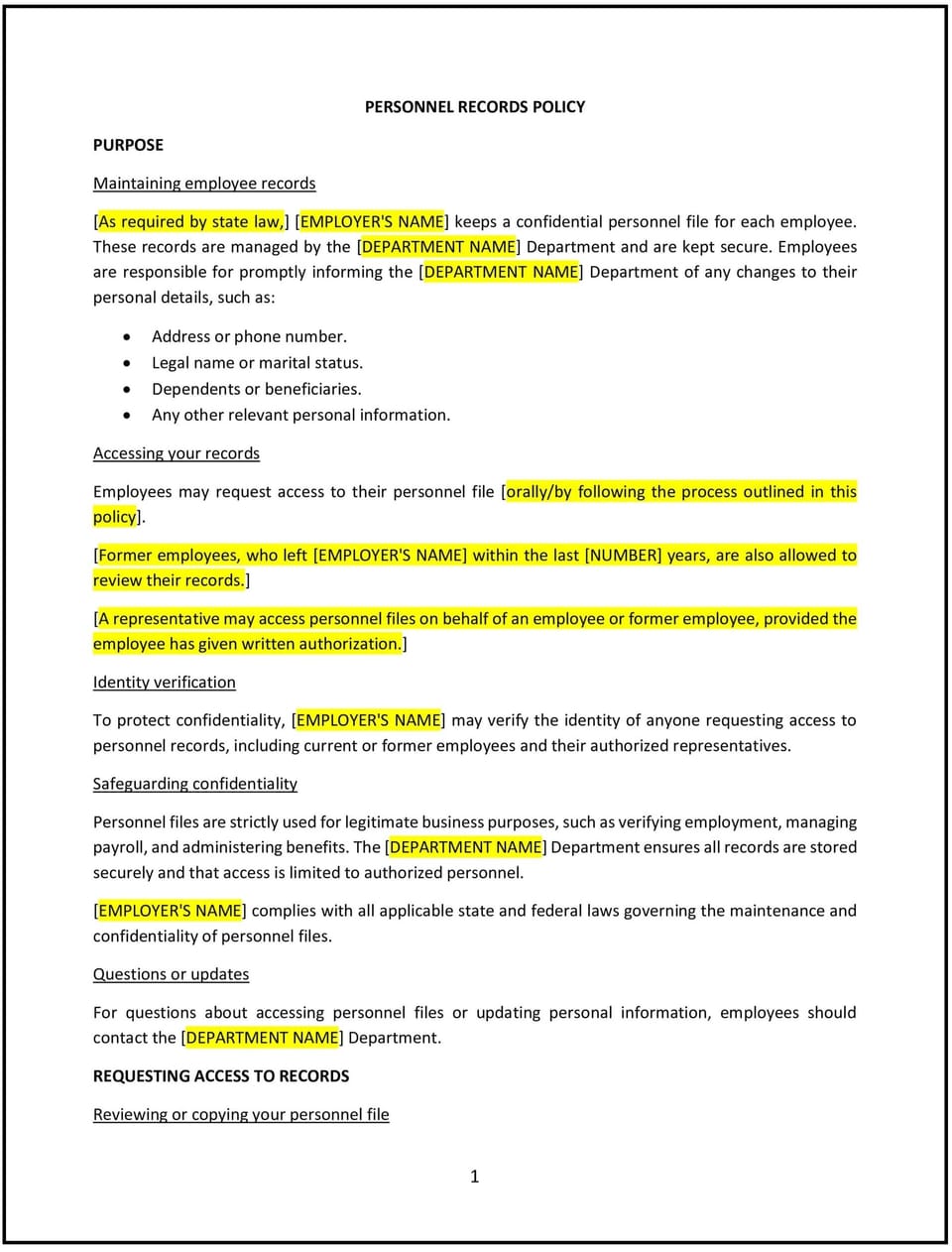Personnel records policy (Georgia): Free template

Personnel records policy (Georgia)
This personnel records policy is designed to help Georgia businesses manage employee records effectively and securely. The policy outlines procedures for maintaining, accessing, and protecting personnel records to promote transparency, safeguard sensitive information, and comply with applicable laws.
By implementing this policy, businesses can ensure accurate recordkeeping, foster trust, and support efficient HR operations.
How to use this personnel records policy (Georgia)
- Define personnel records: Specify what constitutes personnel records, such as employment applications, performance evaluations, and payroll information.
- Establish retention periods: Set clear guidelines for how long different types of records should be retained, considering legal and business requirements.
- Restrict access: Limit access to personnel records to authorized personnel only, such as HR staff or managers, and implement secure access controls.
- Protect confidentiality: Outline measures for safeguarding sensitive information, such as encryption, secure storage, and privacy protocols.
- Provide access to employees: Allow employees to review their personnel records upon request, detailing the process and any necessary approvals.
- Specify update procedures: Encourage employees to update their personal information promptly, such as changes to contact details or emergency contacts.
- Address disposal: Establish procedures for securely disposing of outdated or unnecessary records, such as shredding or digital data deletion.
- Review and update regularly: Periodically assess the policy to reflect changes in Georgia business practices, legal requirements, or organizational needs.
Benefits of using this personnel records policy (Georgia)
Implementing this policy provides several advantages for Georgia businesses:
- Enhances organization: Structured recordkeeping supports efficient HR operations and decision-making.
- Protects sensitive information: Secure practices reduce the risk of data breaches or unauthorized access.
- Builds trust: Transparent processes for record access and updates foster employee confidence.
- Reduces legal risks: Accurate and well-maintained records help businesses address disputes or audits effectively.
- Reflects Georgia-specific practices: Tailoring the policy to local workforce needs ensures its practicality and relevance.
Tips for using this personnel records policy (Georgia)
- Use secure storage: Store physical records in locked cabinets and digital records on encrypted systems.
- Train HR staff: Ensure personnel managing records are familiar with confidentiality and security protocols.
- Regularly audit records: Conduct periodic reviews to ensure records are accurate, complete, and up to date.
- Communicate access rights: Inform employees about their rights to view and update their personnel records.
- Develop a disposal plan: Create a detailed plan for securely disposing of records once they are no longer needed.
Q: What types of documents are included in personnel records?
A: Personnel records typically include employment applications, performance reviews, training records, payroll information, and disciplinary actions.
Q: Who has access to personnel records?
A: Access should be restricted to authorized personnel, such as HR staff or managers, who require the information for legitimate business purposes.
Q: Can employees view their personnel records?
A: Yes, businesses should allow employees to review their records upon request, following established procedures.
Q: How long should personnel records be retained?
A: Retention periods depend on the type of record and relevant legal or business requirements. Businesses should define specific timelines in the policy.
Q: How should businesses protect personnel records?
A: Businesses should use secure storage methods, such as encryption for digital records and locked cabinets for physical files, and restrict access to authorized personnel.
Q: What steps should be taken to dispose of outdated records?
A: Outdated records should be securely shredded, deleted, or otherwise destroyed to protect sensitive information.
Q: How often should this policy be reviewed?
A: The policy should be reviewed annually or as needed to reflect changes in Georgia workplace practices or regulatory requirements.
This article contains general legal information and does not contain legal advice. Cobrief is not a law firm or a substitute for an attorney or law firm. The law is complex and changes often. For legal advice, please ask a lawyer.


